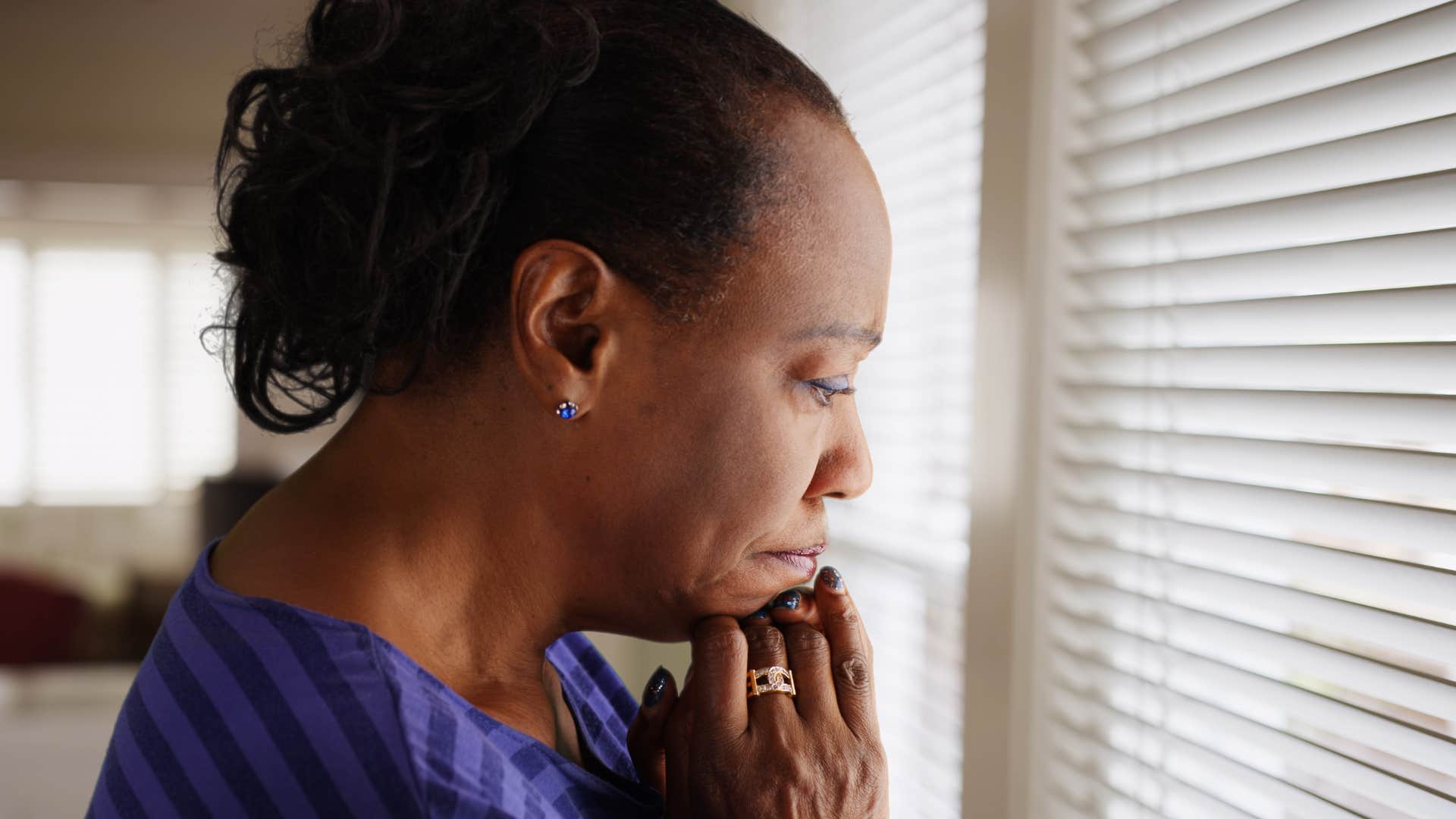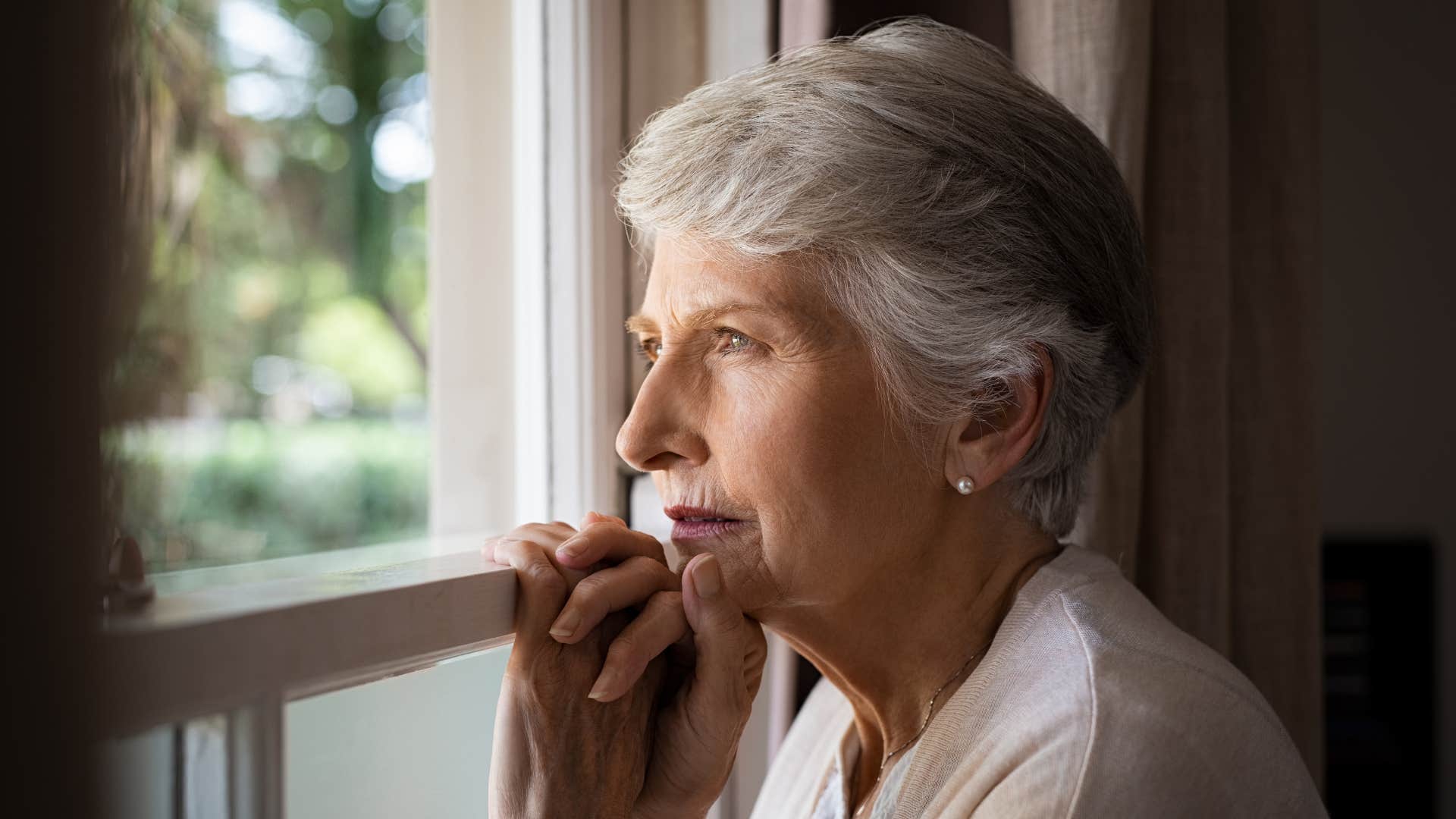People Who Become Karens As They Get Older Usually Have These 11 Reasons
Sometimes the loudest voices are just asking to be heard.
 Ruslan Huzau / Shutterstock
Ruslan Huzau / Shutterstock Over the past few years, we've all heard the term 'Karen,' used to describe a woman who is demanding, difficult, or quick to escalate a complaint. While it's easy to poke fun at or roll our eyes at this concept and the women it describes, the truth is that this behavior often stems from something deeper than simple entitlement. People who become what social media might refer to as a Karen as they get older usually have reasons most of us don't give much consideration.
Society’s view of women's behavior, especially when women are asserting themselves and trying to have their concerns heard, can sometimes carry undertones of misogyny. As people of all genders get older, life can bring unexpected stress and a growing sense of losing control. What might look like an overreaction to the casual observer may actually be a cry for acknowledgement, respect, or connection. Instead of impulsively labeling women we've never met, let's take a moment to understand the real reasons behind why some people grow more reactive with age and what they might truly need.
People who become Karens as they get older usually have these 11 reasons
1. They lack control in other areas of life
 fizkes | Shutterstock
fizkes | Shutterstock
When people who often display Karen-like behavior face challenges in other areas of their lives, they may unknowingly turn to public interactions as a way to regain some sense of control. Behind the outward frustration or entitlement, there is often a deeper feeling of helplessness with their personal circumstances.
They may often feel out of place at work or may be suffering from abuse at home. The desire to assert dominance or make their voice heard becomes a way to cope with those deeper and more unspoken troubles. At the heart of these outbursts is not necessarily a desire to cause harm but rather to search for a sense of stability. The frustration they direct at authority figures or service workers comes from a place of feeling overwhelmed or disempowered.
"The best way to deal with a chronic complainer is to express sympathy and validation," says Guy Winch Ph.D.
When their personal world feels threatened then controlling the small moments becomes a way to feel strong again. In many ways, this behavior is just a cry for attention.
2. They have a heightened sense of entitlement
 Bricolage | Shutterstock
Bricolage | Shutterstock
A heightened sense of entitlement often manifests as an exaggerated expectation of special treatment or privileges that others don't typically receive. This sense of entitlement can create an intense need to control situations, particularly in public interactions.
These women may feel that they deserve preferential treatment or immediate solutions to any minor inconvenience. The heightened entitlement often stems from an internal belief that their needs are more important than those of others. However, this can lead to disruptive behaviors such as demanding a manager to get a lower level employee in trouble or acting rude to those whom they deem beneath them.
"When people feel entitled, they want to be different from others," says Jane Adams Ph.D.
This behavior is often driven by a deeper need to maintain a sense of power in situations that they cannot control. The more their sense of entitlement goes unchallenged, the more likely they are to continue their behavior.
3. They are suffering from burnout and frustration
 PeopleImages.com - Yuri A | Shutterstock
PeopleImages.com - Yuri A | Shutterstock
Just like anyone else, Karen-like individuals experience burnout, which can cause their behavior to become more intense and erratic. The effects of burnout can make people even more demanding and difficult to please than they otherwise were. They may feel that their frustrations are justified and may lash out more aggressively in public. This turns into a battle to try and regain control that honestly wasn't there to begin with.
Customer service interactions tend to suffer the worst treatment from this because of hierarchical systems in place such as customer entitlement. In these moments, frustration may come from a deeper unresolved issue like home or work stress. These accumulated pressures can leave them feeling depleted.
"Some problems are intractable, but often you have more ability to impact your work life than you might realize," says Ellen Hendriksen Ph.D.
This behavior is a reflection of internal struggles to cope with overwhelming stress.
4. They become socially isolated
 Rocketclips, Inc. | Shutterstock
Rocketclips, Inc. | Shutterstock
Social isolation often leads to feelings of loneliness, frustration, and a lack of support can exacerbate their sense of entitlement. This can manifest in exaggerated demands or a heightened sensitivity to perceived slights, as these interactions may be their only means of feeling acknowledged or heard.
Research has found that being ostracized can trigger a deep psychological threat to an individual. It can affect their self-esteem and sense of belonging. In some cases, they might even use these confrontations as a form of social interaction not because they have an actual problem. This could be because they are no longer getting the attention or recognition from their immediate family or circle of friends. This craving for control pushes people away causing them to be even more isolated.
5. They are nostalgic for the way things used to be
 Face Stock | Shutterstock
Face Stock | Shutterstock
When a Karen expresses nostalgia for the good old days, it's often more than just reminiscing about the past. It can reflect a deeper sense of loss, disorientation or discomfort with change. This kind of nostalgia is typically tied to a time when they felt more secure socially, culturally, or personally. As the world around them evolves through shifting social norms, they may feel left behind by a reality that no longer aligns with their values.
Clinging to the past becomes a way of preserving a version of the world where they felt more seen. This longing can sometimes show up as resistance to modern norms or expectations. The confrontational behaviors come from an erosion of the structure of social hierarchy that they once relied on. Instead of adapting to change they expect others to conform to their idea of how things used to be.
6. They have difficulty regulating their emotions
 Prostock-studio | Shutterstock
Prostock-studio | Shutterstock
When a Karen suffers from a lack of emotional regulation. Their reactions to perceived disrespect can become exaggerated and unpredictable. Without it, small frustrations can quickly escalate into public confrontations. A misheard comment can trigger intense emotional responses because they lack the tools to manage their internal stat effectively. This lack of regulation often masks deeper emotional needs.
For someone already feeling insecure, genuine feedback can feel like a personal attack. "Self-awareness is sometimes considered an emotional regulation skill. If we are not self aware, we are going to have a hard time being aware of our emotions," says Tchiki Davis, Ph.D.
Instead of pausing to reflect or solve the problem, they lash out by raising their voice and making demands. These outbursts can reinforce a cycle of conflict and alienation, making it even harder for them to feel truly seen.
7. They feel a sense of superiority
 Estrada Anton | Shutterstock
Estrada Anton | Shutterstock
Social privilege plays an important role for some Karen-like individuals, especially if they perceive others as being of a lower social status. It can begin with condescending tones or the expectation that the rules don’t apply to them. In their minds, asserting themselves is justified because they believe their perspectives carry more weight than those of other people. This mindset often distorts how they interpret everyday situations.
Minor inconveniences can feel like direct challenges to their status, even when others involved don't see them that way. As a result, they may overreact or escalate situations unnecessarily.
"The pursuit of superiority lowers happiness levels. And what’s more, it also lowers our chances of success," says Raj Raghunathan Ph.D.
8. They fear being ignored or dismissed
 PeopleImages.com - Yuri A | Shutterstock
PeopleImages.com - Yuri A | Shutterstock
Women who participate in Karen-like behavior have a fear of being ignored or dismissed. This fear may be rooted in past experiences where they may have been overlooked or unheard, which is something that happens to the vast majority of women at some point.
As a result, they become hyper-vigilant to any slight or indifference directed towards them. Their assertiveness can now be looked at as an individual trying to avoid the painful feeling of invisibility rather than of entitlement. This fear has the power to distort how they interpret others' behavior. A delayed response or a lack of immediate validation may trigger feelings of rejection.
"Being ignored creates feelings of self-doubt, feeling a lack of control, and feeling not worthy of attention," says Deming (Adam) Wang Ph.D.
So their actions are not just by a desire for control but by a yearning to feel significant in a world that may have made them feel otherwise.
9. They've been influenced by an echo chamber
 KinoMasterskaya | Shutterstock
KinoMasterskaya | Shutterstock
When a someone is influenced by echo chambers, her worldview can become increasingly rigid. Echo chambers are social environments where one's ideas are consistently repeated and rarely challenged. Surrounded by voices that agree with their views, whether online or in social circles, may cause them to believe that their ideas are morally and socially correct. This reinforcement makes it even harder to consider alternative perspectives.
Within these echo chambers, outrage and control-seeking behavior can be subtly rewarded with approval or validated. A shared disdain for changing social norms or threats to traditional values can strengthen the belief that being assertive is a necessary defense.
In this way, the echo chamber doesn't just reflect their beliefs but magnifies them. Making the line between advocacy and antagonism harder to see.
10. They have growing anxiety about change
 DimaBerlin | Shutterstock
DimaBerlin | Shutterstock
Change, whether social, cultural, or generational, can be deeply unsettling for individuals who find comfort in normality. For some, especially those who have benefited from traditional systems or social norms, rapid change can feel like a threat to their identity. This anxiety doesn't always manifest fear but instead comes from a resistance to do anything different.
Rather than adapting, a Karen might double down on past expectations, expressing nostalgia for a time when they felt more respected. Even small shifts such as inclusive language can trigger a negative response. This discomfort fuels the need to assert control over everyone around them.
"Just because you feel anxious does not mean something bad is going to happen," says Susan Biali Haas M.D.
At its core, this is just resistance to progress, it’s an emotional response to feeling perilous in a rapidly evolving world.
11. Complaining has become a habit
 Ground Picture | Shutterstock
Ground Picture | Shutterstock
When a Karen behaves in certain ways out of habit, then it means it's a long-standing pattern for them. Habitual behavior, especially when shaped by years of social conditioning or unexamined privilege, can lead someone to act with a sense of authority. Demanding special treatment when it’s well known that this is not how the world works can make someone look entitled or even delusional.
In this case, behavior isn't always a reaction to fear but a routine. And like many habits, it can persist even when it no longer serves a purpose or fits the context. These ingrained responses can be especially difficult to recognize or change without reflection or feedback, which they rarely receive. When habitual behavior meets a changing world that values empathy, equity, and inclusions, friction naturally arises.
Sylvia Ojeda is an author who has over a decade of experience writing novels and screenplays. She covers self-help, relationships, culture, and human interest topics.

